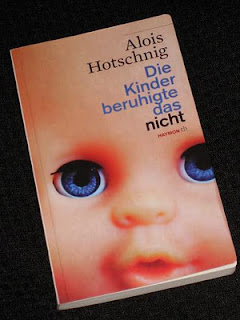*****
Kristina Carlson's Mr. Darwin's Gardener (translated by Emily and Fleur Jeremiah, review copy courtesy of the publisher) is a novella in five short parts, set in a Kentish village in 1879. We start with a certain Thomas Davies, an outsider in the village for reasons other than his Welsh origins. You see, in a fairly religious community, Davies is the gardener of a local celebrity - none other than the elderly Charles Darwin, and it's surely no coincidence that Davies is the local atheist...
Davies recently lost his wife to illness, and his children both have (undefined) health issues. Darwin's gardener has many reasons to not join the congregation on Sundays - the issues he's had are enough to make anyone question their faith. The villagers, safely ensconced in their church, look askance at this modern man, resenting people who step outside the herd. However, the book slowly reveals that everyone must deal with the question of faith alone...
Mr. Darwin's Gardener is a lovely little book, one with an intriguingly familiar setting for an Englishman (seen from a Finnish perspective!). However, as much as the place is important, it's the time which is crucial:
"People in future decades and centuries will react to our ideas superciliously, as if we were children playing at thinking. We shall look most amusing in the light of new thoughts and inventions."Which is an amusing nod to the supercilious reader ;) The year is 1879, and we are very much at a turning point in cultural history.
p.72 (Peirene Press, 2013)
Darwin's theories on evolution are now well known, and even devout, church-going people have begun to consider their beliefs more closely. Life in the village is starting to change as young people yearn for the big city and the chance of more freedom. This is also the era of electricity, and while the village isn't as yet connected, we sense that big things are just around the corner.
The small English village is a tiny melting pot, a microcosm of society, ideal for a study of the effects of change. Despite the idyllic surface, there's a lot going on that outsiders can't see, with nasty secrets festering underneath:
"Righteousness spreads like pestilence, Henry Faine thought.So what are those net curtains hiding? Alcoholism, sexual frustration, manipulation, violence - and, above all, a distinct absence of hope...
Revenge brings great satisfaction, everyone has stored up things to avenge, but the victim is not always about. So when a common enemy is found, people seize the opportunity - in the name of God, the church or a woman. Or because a country village is somewhat short of entertainment." (p.52)
It's against this backdrop that the struggle between the old order and progress takes place. Davies, the Welsh gardener, is certainly one who has no time for old beliefs, preferring to pin his 'faith' in science than in an absent deity. He is roundly mocked for burning his wife's solid wooden bed outside after her death, laughed at for the needless waste. Obviously, the villagers are not quite up on the latest thoughts on medical hygiene...
The book is well constructed, built upon five 'scenes', each contributing to the overall story. We see the self-satisfied villagers in church (and at the local pub), sewing for the local poor (and taking revenge on a light-fingered verger), sitting through the cold December - and enjoying the return of spring. The characters gradually take shape, names taking on features: the snobbish Henry and Eileen Faine, the alcoholic doctor Robert Kenny, wheelchair-bound Hannah Hamilton. By the end, they're all old friends - it's like a slightly twisted version of The Archers.
Although the story is interesting, it's the writing which makes the book, with Carlson using a range of styles to achieve her purpose. One of these is a polyphonic chorus of voices, a feature that reminded me of Virginia Woolf's The Waves at times:
"The congregation sits in pews and the jackdaws caw in the steeple.The 'I's and 'We's scattered throughout the book are insights into the psyches of the villagers. However, in other parts, the writing can be a lot more detached, especially when the gardener speaks. This, perhaps, is a deliberate attempt to differentiate between the emotional villagers and the 'rational' Davies.
We smell of wet dog. The rain drenched us. We are cold but singing warms us. The hymn rises up to the roof. God lives above the roof, amen.
We saw Thomas Davies on the hill. He works in Mr. Darwin's garden.
An atheist and a lunatic, he stood alone in the field, water whipping his face.
A godless pit pony wandering in the dark, he hails from Wales.
Does the heathen think he can avoid getting wet outside? Did the Devil give him an umbrella, or bat's wings?
Perhaps Thomas imagines he can control the rain. He thinks he is higher than God. He has his head in the clouds." (p.16)
In fact, Mr. Darwin's Gardener is a short book full of contrasts. We have pub bores trading quips, honouring the lord and secretly beating up a man after dark; bored women using their needles while sipping tea, then sleeping with newcomers to the village. This is certainly a turning point, but we're not quite into the modern era yet, and this delicate balance is what makes the book so fascinating to read. Like most Peirene books, it's one which needs to be read again if we're to really get behind what the writer wants to say - and I hope to do that very soon :)




















